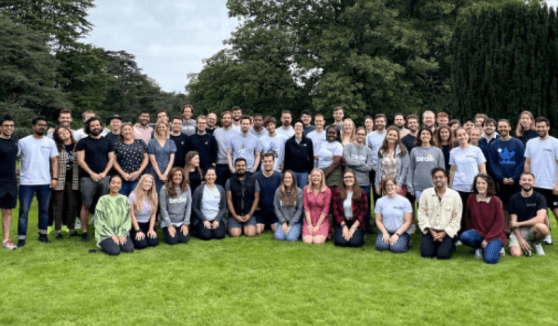
It is a sign of societal progress that we are living longer. In the UK, average life expectancy is 82 years old, 12 years more than it was in 1950. The same trend is happening worldwide as populations age rapidly.
By 2030 one in six people in the world will be 60 or over. And by 2050 the world’s population in this age bracket will double to 2.1bn, according to the World Health Organization.
But an ageing population also brings challenges for seniors suffering illness as they age, their carers and health systems. More than 20% of people 60 or over suffer from a mental health or neurological disorder, such as dementia. It is estimated 50m people globally have dementia, a number expected to increase to 152m in 2050.
The eldercare sector is ripe for technological disruption as the costs of caring for an ageing population put health systems under pressure. Startups are active in developing treatments for age-related diseases, such as Alzheimer’s and Parkinson’s, many of which use artificial intelligence to develop precision medicines.
Startups have also designed technology to help care for seniors in their homes instead of in more costly settings, such as hospitals and residential care facilities.
Financing rounds tend to be large because of the high costs of developing treatments. Despite the money ploughed into research and development, treatments for diseases such as Alzheimer’s have not had much success to date.
Corporates are active in many deals, with pharmaceutical companies often taking the lead on financings for biotech startups. US biopharmaceuticals company Amegen, for example, has been an active investor in this area. Hospital groups such as Mass General Brigham and the Mayo Clinic are also, as you might expect, backers of these elder-care startups.
But it is not just healthcare-related corporations that are getting involved. Technology companies and even energy majors, such as Saudi Aramco’s Prosperity7 unit, are also taking part in financing rounds.
Here are nine startups to watch in the senior care sector, including seven that have corporate backing:
Rippl
The US startup defines itself as a new kind of mental health company for seniors. Launched in September 2022 with $32m in seed funding, it aims to keep seniors with dementia and other neurocognitive disorders out of hospital and long-term facilities by providing 24/7 care on the phone, online and at home.
Keeping seniors out of hospital and long-term residential care is a recurring theme of startups entering the sector. Elders with neurocognitive mental health conditions are more than three-and-half times more likely to visit the emergency room in the US, and more than three times more likely to be admitted.
The seed funding was led by venture capital firms ARCH Venture Partners and General Catalyst. Rounding out the funding are corporates Google Ventures and Mass General Brigham Ventures, the investment arm of the US hospital group.

Caraway Therapeutics
This US biotech company aims to disrupt the degradation of mitochondria, the building blocks of cells that release energy for the body. Mutations are linked to several neurodegenerative diseases such as Parkinson’s disease.
The startup raised $23m in series A funding in 2018. The round was co-led by MRLV, the corporate venture arm of US pharmaceutical company Merck, and AbbVie Ventures, the investment arm of the biopharmaceutical company. Other investors include Amgen Ventures, Alexandria Venture Investments and the Mayo Clinic.
Earlier this year, the company received a third research grant from The Michael J. Fox Foundation for Parkinson’s Research.
Neumora Therapeutics
Launched in 2021, the US startup develops software that uses data science to develop targeted therapies for brain diseases. It has amassed multiple open-source and proprietary datasets, which help it match patient populations with targeted medicines.
It was founded as a response to the lack of effective medicines for neurodegenerative illnesses. As in cancer treatment, data science has helped scientists to hone in on developing precision medicines that are designed for specific patient groups. The same technique can be used for brain diseases.
The startup launched with $500m, including a $100m equity investment from Amgen, a US biopharmaceutical company. Its backers include Arch Venture Partners, Alexandria Venture Investments, Altitude Life Science Ventures and Catalio Capital Management.

Birdie
This four-year old UK tech company targets the home healthcare sector for seniors. Its software is designed to help healthcare providers manage home health services through an easy-to-use app. Healthcare managers can use it to match carers to patients, manage visits, and even pay carers. The app can also be used to share medication schedules and record pressures sores and injuries that require immediate treatment.
In June it raised $30m in series B funding led by investment firm Sofina. Corporate investor OMERS Ventures, the venturing arm of the Canadian defined benefit pension plan, took part, as well as investor Index Ventures.

PolyCore Therapeutics
This US biotech company develops treatments for patients of Parkinson’s disease who suffer involuntary movements, a common side-effect of the illness and its treatment. The startup has created drugs designed to improve patients’ motor symptoms while they receive medicines.
Venture capital firms Xontogeny, an investor of life science technologies, and Ben Franklin Technology Partners of Southeastern Pennsylvania provided seed investment of an undisclosed amount in April this year.
Neuron23
Founded in 2018, this California-based biotech startup makes precision medicines for neurological diseases, including Parkinson’s disease. It uses machine learning to identify patients who are most likely to respond to its medicines.
In March it closed a $100m series C financing round led by SoftBank Vision Fund 2, bringing its total financing raised to $213.5m. Other backers include Westlake Village BioPartners, Kleiner Perkins, Acorn Bioventures and Surveyor Capital.
Arkuda Therapeutics
The startup develops medicines that target lysosomal dysfunction, a key driver of neurodegenerative diseases. The Cambridge, Massachusetts-based company has created a drug that modulates progranulin, a protein known to play an important role in lysosomal function.
In February, Arkuda raised $64m series B financing co-led by Cormorant Asset Management and Pivotal bioVenture Partners. Corporate investors include Eli Lilly and Pfizer Ventures.

Juvenescence
The life sciences startup works on prescription medicines that help modify ageing. Like many other startups in this field, it uses artificial intelligence and machine learning to develop drugs. It also has a consumer products division that develops nutritional products for consumers seeking to manage symptoms of ageing.
The last publicised VC fundraising was in August 2021 when it raised $100m in a series B round from private investors Grok Ventures and IPGL. Part of Juvenescence’s business plan is to partner or invest in new companies with longevity-related therapeutics. In 2019 it bought Souvien Therapeutics, a biotech company focusing on epigenetic causes of neurodegeneration.
Insilico Medicine
This Hong Kong-based biotech startup uses automated AI software to cut down on the long research time common in the discovery and design of new drugs for age-related diseases, cancer and fibrosis.
The startup’s latest corporate backer comes from the energy sector. In August, it closed a $95m series D2 round led by Prosperity7, the diversified growth fund of Aramco Ventures, the investment unit of the Saudi oil company. Some of the new funds will be used to finance the startup’s entry into sustainably chemistry, green energy and agriculture. Insilico partners with Chinese agtech company Syngenta to work on innovations in sustainable agriculture.
